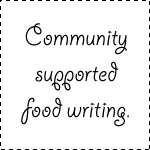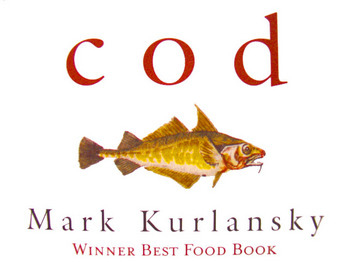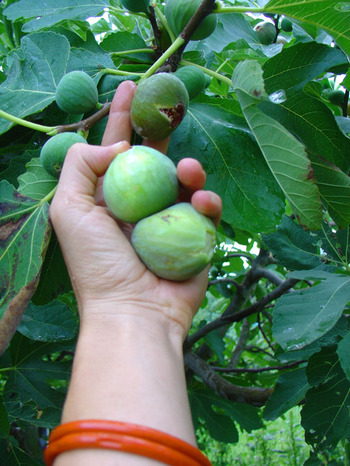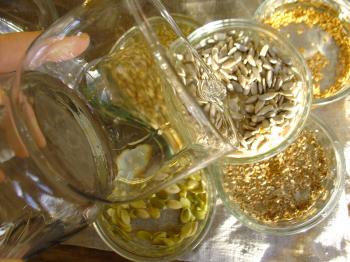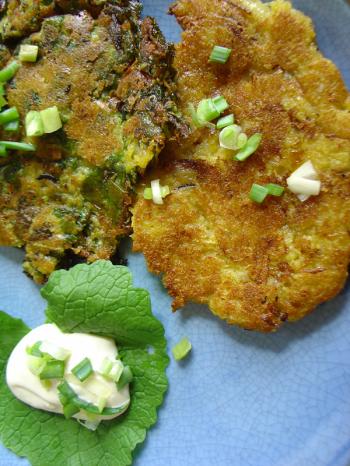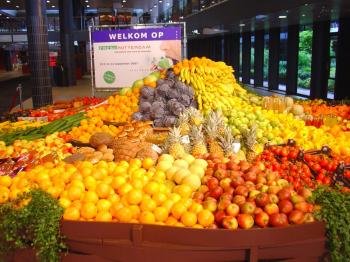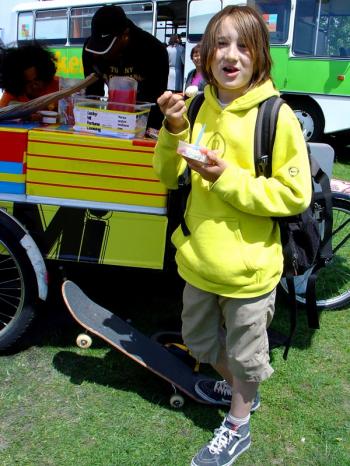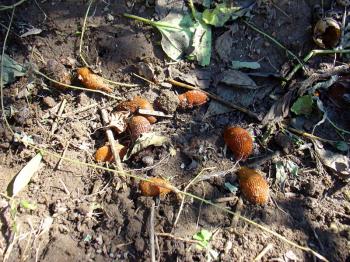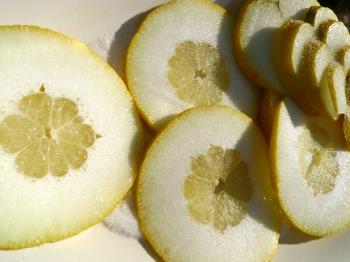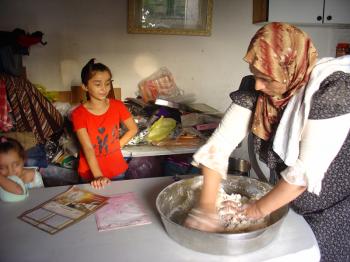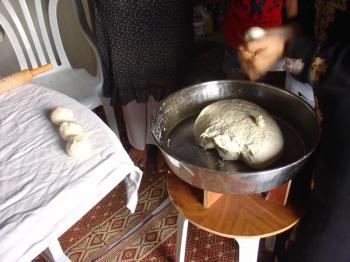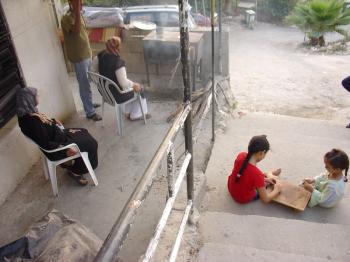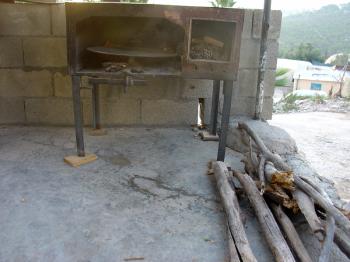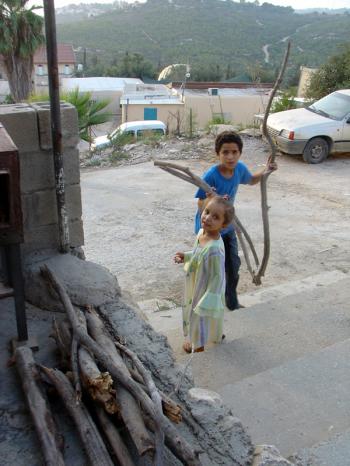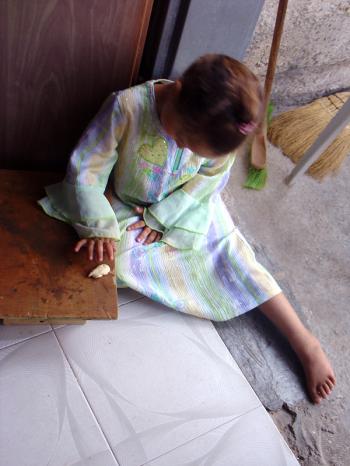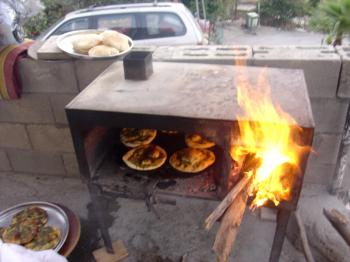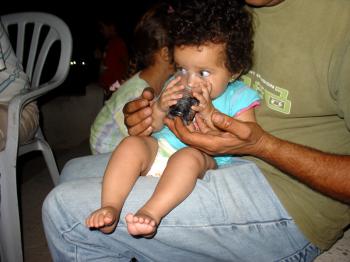The Negev water blog
September 24, 2008
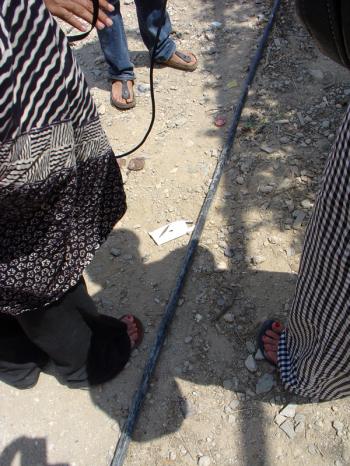
Graphic description of water discrepancy
Put your thumb and index finger together. That hole is the diameter of the incoming water line for an entire village of Bedouin families living in the Negev Desert in Israel. This water doesn’t come from the Israeli water grid, because this village, in official terms does not exist. In this village, like several hundreds of others, around 200 people are using a water line the size of the international hand signal for ‘everything is A-OK’.
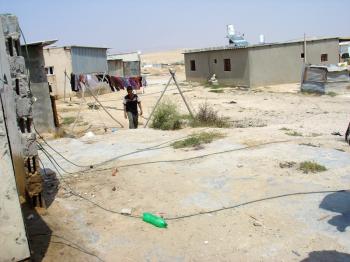
Electrical lines in a Bedouin township criss-cross between the homes
Whilst visiting one such unrecognized village, our group, participants in the One Land project in Ayn Hawd, was generously hosted for lunch by a town elder. Because a part of my brain is permanently in the gutter, and I had just taken photographs of miniscule makeshift water infrastructure, I was surprised to find a Western style flush loo. My curiosity got the better of me and I later asked our host (an articulate engineer) about his loo. He said that here in the Negev, like everywhere else in the world, dry toilets although possibly better suited to a tenuous situation in which every single house here has a demolition order, dry toilets simply suffer from cultural taboos. Just like everywhere else.
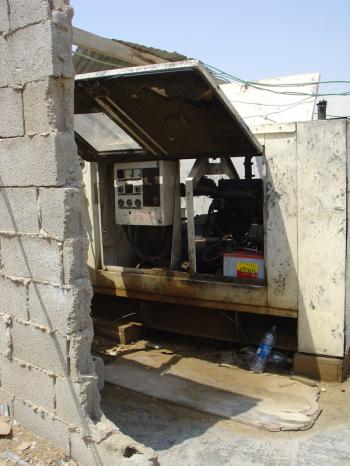
Building housing the generator supplying electricity to the homes
Dang if that’s not a huge hole in the market, making dry toilets culturally desirable for everyone - and not just folks living in terrible conditions in unrecognized villages. So, who is tackling the cultural taboos associated with dry toilets and who has their heart set on making them aspirational? I’d like to introduce you to some people that I know.
- 12 Points of Blueprint Negev - at the Jewish National Fund website. Not in my name please!
An alternative initiative to Blueprint Negev is called Save the Negev. Video by F.A.S.T
Basic information on dry and composting toilets, a wikipedia jump page
and elsewhere in Israel:
The Association of Forty (Galilean Unrecognized Arab villages - photographs of water infrastructure)
Wikipedia entry on the recently recognized village of Ayn Hawd
A video about the Unrecognized Arab villages of Israel situated in the North
List of Palestinian villages depopulated during the 1948 Arab-Israeli War
debra at 17:48 | Comments (2) | post to del.icio.us
Ayn Hawd bread story
September 2, 2008
At the beginning of my first week in Ayn Hawd, if Noga and I opened our windows just right, we could create a lazy crosswind that would exhale her curtains, just as it inhaled mine. Exhale mine, inhale hers. Slow puffs of curtain with the power to close eyelids. Exhale hers, inhale mine.
But the air has been still in Ayn Hawd now for days. It’s very, very hot, extremely humid, heavy weather, a curse on urban clothing and travelling light. Towards the middle of the day, our movement slows to slo mo or just no. Thoughts of escaping the heat are pervasive, even for a desert-born girl like me. Any glance out of the village brings the sea into view, a view which no amount of sea haze can obscure. Alberto, Ali, Alice, Manu, Maurizio, Noga and I vow to end each working day with a short swim, leave the village at 19h and return two hours later.
But this plan never seems to suit the rhythm of my work; finding out what the ladies of Ayn Hawd produce with all that they grow here and setting up their market. All the production and socialising goes on when it’s cool, which is exactly when my colleagues go swimming. So when Hannan promised to show me how she makes bread using her wood burning stove, I was slow to realise that her rhythm wouldn’t include an escape to the beach. She’s barely done with the kneading and Ali looks at his watch, puts down his camera and with a serious face tells me Everyone has long tired of waiting for me. Off they go and I’m stuck here. Damn if I haven’t seen hundreds of people make bread in my life, made it hundreds of times myself. Especially flat breads, it’s so no big deal and I’m absolutely deflated knowing that I’ll miss out on my colleagues body surfing in possibly unusual swimsuits, showing off silly water moves in the modest waves.
Hannan’s house is situated on the high corner of what functions as the village square and where porch socializing at all the homes spills out onto the street. Everyone lingers at this corner of the village until invited in, and that never takes very long. Hannan is there at a sort of crossroads, with her particularly cute and expressive baby Mahe, luring smiles, perched atop a hip. Hannan and I get along like a house on fire, partially because she speaks fantastic English she insists she learned in Jenin. But it was the baby Mahe’s toes and expressions that initiated our first conversation.
Flour, yeast, salt and water. Mix it up, somehow get that exotic stove on the corner of the porch lit without lighter blocks, patty cake, bakery bake, and off I’ll go to the beach at 19h. That’s the thing, it’s been really hot and humid. After a day of speaking to everyone except Hannan using a mere 47 words of Arabic, including the ones that have nothing to do with food like ashtray and lighter and tomorrow. Lots of pointing fingers and gesturing and searching up point-it pictures on the camera, the beach would’ve been so nice. I kept hoping that this would be a simple and speedy affair, pita za’atar.
Hannan’s 3 yr. old daughter Marjan gathers wood from an until now invisible pile in the square, drags back long branches 3 times bigger than herself to the pile on the porch near the iron bread oven. It’s like she’s playing. She’s wearing a dress seemingly designed by My Little Pony, and my little photographs will later prompt Maurizio to wag his finger and use the ‘O’-word. For orientalism. This in turn will prompt me to sigh dramatically, roll my eyes and strike a dramatic pose. Fuck the swirls, the palet and the pattern. If you insist.
The more the heavy weather slows down the Debra organism, the more it speeds up the bread organism. In the time I’ve nearly stopped thinking about the beach, 40 balls of bread have risen off the thick exhalation of yeast breath. Hannan keeps telling me how important it is for her that her babies taste her bread, synonymous with tasting her smoke and her fire. She shoves the wood uncut into the stove, and the ends that stick out form a baby barricade. Embers splatter down on the cement each time a chunk of wood breaks off from the flames in the oven, and the right shoes of newly gathered women are swept off in unison to swat them away from our feet.
Hannan and Nadá bring out the rolled dough on platters. From under the sheet where it’s been rising, it smells like yeasty alcohol. With the back of a spoon they smear the pita with za’atar paste. Home made za’atar, home plucked herbs, home ground. I watched while neighbour Nadá made it this morning, each iteration of this recipe somehow perfumed. Home grown hand picked olives, brought to the big press somewhere to make basically home made olive oil. The za’atar on the pita pools into half moons made by the tip of a spoon, indentations preventing the pita from blowing up in the oven like a full moon.
A crowd has started to gather on the steps to the side of Hannan’s porch as I run off to fetch Noga, who also has stayed behind working, and more than any of us deserves some performative food conviviality. The bread-making pulls focus from all other village activities and I begin to feel sorry for my colleagues urbanising at the beach. Hannan hands out mankoushe after mankoushe to everyone here, folded in half, still warm, bubbled breads aromatic of herb and excellent of texture. All the buzz is silenced when we take the huge bites that centre our attention. Elation. Exhalation.
The next day’s roam through the village lands me on Hannan’s porch again and I confess to her that yesterday’s bread evening was the best time I’ve had here. Beaming, she lets me know that she has been inspired to start a bakery on this very spot.
A shout out to the ladies Q & H back home whose muse-ic forms my soundtrack at the moments I miss home the most. And to KvR, and to DLP, look forward to seeing you when I see you again.
debra at 23:02 | Comments (4) | post to del.icio.us
